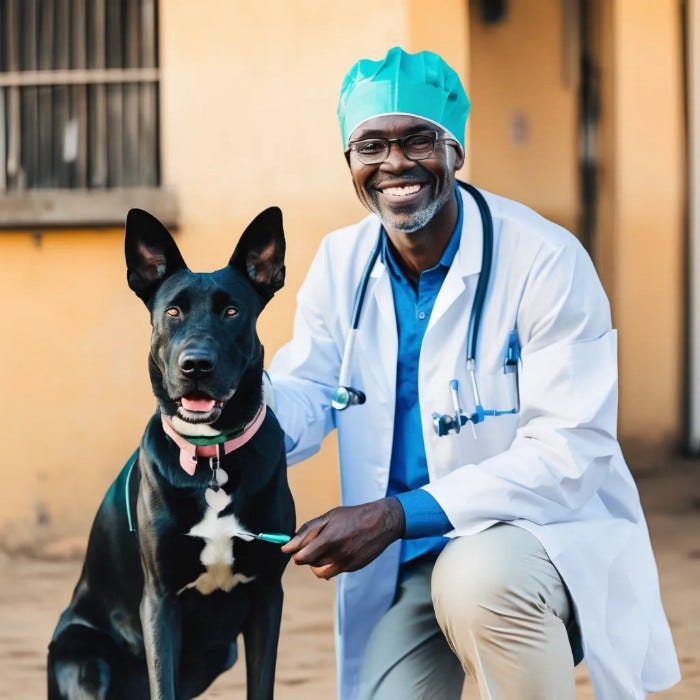Even with women's increasing careers as veterinarians, why are there so few Black women?
When men flee career fields where women thrive
There was a guy in high school who refused to call me by my first name. Every time he saw me, he called me “Why?” The reason? I never could just accept something that I didn’t understand. It’s a nuisance to some people who meet me (especially supervisors), but “because I said so” just doesn’t work for me. Blame my parents and grandparents, who were patient enough to answer my questions. Blame my social circle, who would egg on my “why?” soapbox moments. I want to know why something is happening or why something is not happening. And sometimes I don’t always get my question answered.
In 2016, when I was writing a series called “Let’s Get Back To Work” for CBS Chicago, instead of looking for easy interviewees who I could find in any mainstream publication, I started looking for who I rarely read about and reached out to them. I was very happy with the diversity in my CBS Chicago interviewees, but there was one particular career field that always left me going “Why?” I was having a tough time finding Black veterinarians — men or women. From pet magazines and the industry itself, you would swear Black people didn’t like pets. (This belief that we’re all terrified of German Shepherds and animals in general has lasted way too long.)
Recommended Read: “Want to combat your prejudices? Expose yourself to ‘others’ ~ The German Shepherd question that explains my take on racism”
So I decided I was going to pitch a separate story to other news outlets about Black people taking on a career field as veterinarians. (This was a couple of years before I started the Black Girl In a Doggone World series in June 2019, and even before I became a dog walker for Wag! and Rover.) I reached out to one particular organization after carefully choosing African-American veterinarians, and one of the members of management asked me did I want to interview them solely because they were Black.
Recommended Read: “Man’s best friend becomes retail’s best customer ~ How the evolution of families have changed pet ownership”
I paused over this statement. The obvious answer was “yes.” But the way the question was posed was as if there was something wrong with that. The irony is I reached out to staff members from a local college for the same reason, and a flood of Black men and women professors were elated to talk to me.
ADVERTISEMENT ~ Amazon
As an Amazon affiliate, I earn a percentage from purchases with my referral links. I know some consumers are choosing to boycott Amazon for its DEI removal. However, after thinking about this thoroughly, I choose to continue promoting intriguing products from small businesses, women-owned businesses and (specifically) Black-owned businesses who still feature their items on Amazon. All five of my Substack publications now include a MINIMUM of one product sold by a Black-owned business. (I have visited the seller’s official site, not just the Amazon Black-owned logo, to verify this.) If you still choose to boycott, I 100% respect that decision.
I don’t remember what my response was to the Black vet question, but it was something to the effect of wanting to bring attention in an ever-changing field where I was starting to see more women than I did in the ‘90s. The manager responded with “Good luck” and shut down all members from talking to me. It was the most bizarre reaction I’d received to an article pitch. It came off like they were ashamed of the inclusiveness and the change in gender and racial makeup. After that, I abandoned the article idea.
I hadn’t thought about it anymore up until I read the following post from
that discussed college enrollment, sexism, veterinarians and a host of other issues.I read this article today and started counting off the number of Black women I run across in my dog Junee’s veterinary office. They’re not the actual veterinarians, but they’re at the front desk, answering messages, giving me pet advice and greeting my dog outside. (There was one Black tech guy, but he disappeared.)
Recommended Read: “Do black pet owners live longer than black non-pet owners? ~ Why I chose to participate in the Dog Aging Project”
ADVERTISEMENT ~ Amazon
As an Amazon Affiliate, I earn a percentage for every purchase with my referral links.

That’s not to say that every single vet’s office is full of Alfreda Johnson Webbs, but it’s definitely different than who I saw as a kid and pet owner. According to the Bureau of Labor Statistics, in 2023, there were 87,000 employed veterinarians. Of that number, 69% were women, 90% were white, 1.3% were African-American, 5.9% were Asian and 7.9% were Hispanic. Clearly, it’s not like Black women are taking over in the veterinary field, but women are clearly showing up in greater numbers.








